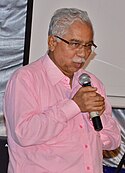Chandrashekhara Kambara
| Chandrashekhara Kambara ಚಂದ್ರಶೇಖರ ಕಂಬಾರ |
|
|---|---|

Kambara during a talk about "Kannada in Technology" in Bangalore, 2013
|
|
| Born |
2 January 1937 Ghodageri, Belgaum, Bombay Presidency, British India |
| Occupation |
Poet
|
| Nationality | Indian |
| Alma mater | PhD from Karnatak University, Dharwad |
| Period | 1956–present |
| Genre | Fiction |
| Notable awards |
Jnanpith Award Sahitya Akademi Award Padma Shri Pampa Award |
| Spouse | Satyabhama |
| Children | 4 |
Chandrashekhara Kambara (born 2 January 1937) is a prominent Indian poet, playwright, folklorist, film director in Kannada language and the founder-vice-chancellor of Kannada University in Hampi. He is known for effective adaptation of the North Karnataka dialect of the Kannada language in his plays, and poems, in a similar style as in the works of D.R. Bendre.
Kambara's plays mainly revolves around folk or mythology interlinked with contemporary issues, inculcating modern lifestyle with his hard-hitting poems and has become a pioneer of such literature. His contribution as a playwright is significant not only to Kannada theatre but also to the Indian theatre in general as he achieved a blend of the folk and the modern theatrical forms.
He has been conferred with many prestigious awards including the Jnanpith Award in 2011 for the year 2010,Sahitya Akademi Award, the Padma Shri by Government of India, Kabir Samman, Kalidas Samman and Pampa Award. After his retirement, Kambara was nominated Member of Karnataka Legislative Council, to which he made significant contributions through his interventions.
Chandrashekhara Kambara was born in Ghodageri, a village in Belgaum district of Bombay Presidency (today in Karnataka). He was the third son in the family, with brothers Parasappa and Yallappa who still reside in the small house belonging to the Kambara family in the village. From an early age, Kambara was interested in folk arts, local culture and ritual. His favorite Kannada writers include Kumara Vyasa, Basava, Kuvempu and Gopalakrishna Adiga and among English writers, it is W. B. Yeats, William Shakespeare and Federico García Lorca.
...
Wikipedia
